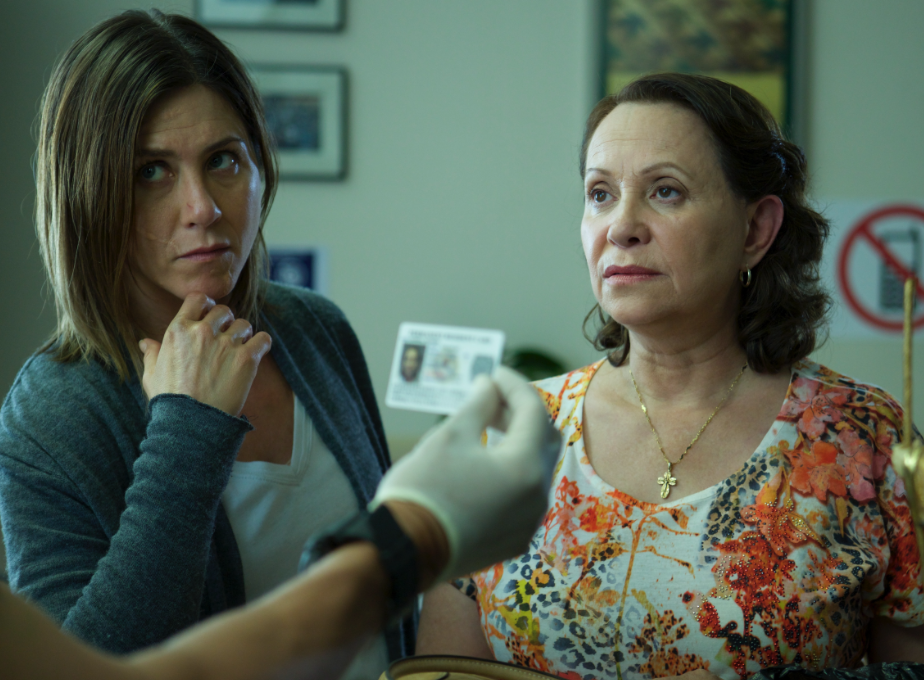 Jennifer Aniston is a terrific comic television actress. This is not to damn her with faint praise – since the 1970s, comedians have done their best work in that medium – but it does mean she’s a less appealing movie star. With her predilection for double takes, cocked eyebrows, and talking from one side of the mouth, her shtick (like Sarah Jessica Parker’s and Tina Fey’s) has never successfully translated to the big screen. Magnified to that scale, she seems more like Ethel Merman on the Paleo Diet than a true screwball siren. Yet she soldiers on in film, even as most of her “Friends” costars have found their footing in the brave new world of premium TV.
Jennifer Aniston is a terrific comic television actress. This is not to damn her with faint praise – since the 1970s, comedians have done their best work in that medium – but it does mean she’s a less appealing movie star. With her predilection for double takes, cocked eyebrows, and talking from one side of the mouth, her shtick (like Sarah Jessica Parker’s and Tina Fey’s) has never successfully translated to the big screen. Magnified to that scale, she seems more like Ethel Merman on the Paleo Diet than a true screwball siren. Yet she soldiers on in film, even as most of her “Friends” costars have found their footing in the brave new world of premium TV.
So it’s no surprise that Aniston occasionally tries her hand at serious roles: She played a cleaning woman in “Friends With Money” (2006) and an unhappy clerk in “The Good Girl” (2002). But in both those films – as in “Cake,” which is now playing in wide release – she merely eliminated her shtick without replacing it with other colors. The resulting characters are Debbie Downers: flatliners from a woman capable of sizzling one-liners. “Cake” is a particular disappointment, though the blame cannot entirely be assigned to Aniston. It’s tough to warm up to another entry in the growing genre that Grantland’s Wesley Morris has called the “dead-child movies.”
In this one, Aniston plays Claire, a well-off Los Angeles chronic pain patient with a chronically bad attitude; she’s a vision in prosthetic facial scars, lank hair, and cashmere sweatpants. Director Daniel Barnz and writer Patrick Tobin take their time in establishing the cause of her embitterment, but affluent people mourning a child has become such a cinematic cliché – the default tragedy of bourgeoisie indies, perhaps because it’s un-controversially devastating – that the signs are visible a mile away.
The twist here is that Claire does not suffer sweetly. Instead, she’s a real pill, which is fitting since only pills perk her up. It’s not that her pain isn’t authentic – a car accident has injured her so badly that she can’t move without wincing – but she’d rather pay her pain forward than brook any self-help pabulum or even garden-variety kindness. She’s driven away her physical therapist (an underutilized Mamie Gummer) and her gentle, grieving husband (Chris Messina); she’s listless with the married groundskeeper she occasionally shtups. The only person to whom Claire is civil is the doctor (Lucy Punch, dazzlingly guileless) prescribing extra painkillers. She’s even expelled from her support group after sarcastically cheering the suicide of fellow member, Nina (Anna Kendrick).
At least Nina gives as good as she gets – and, yes, she does so as a ghost. Or is she an Oxycontin-induced hallucination? The distinction doesn’t matter since, either way, her tauntingly peppy cameos are just another heavy-handed plot device – in this case, one that acquaints Claire with her own suicidal impulses. Eventually, Claire bullies her former counselor (Felicity Huffman) into coughing up the contact information of the deceased woman’s widowed husband (the always-appealing Sam Worthington), whom she then half-heartedly stalks. The foxhole friendship fused between these two is actually less plausible than any supernatural apparitions; suffice it to say it entails far too much tequila, as well as – wait for it – a cake.
Scenes with Adriana Barraza, who plays her underpaid, overworked housekeeper Silvana, offer some salvation – but not due to the part as written. Efforts are made to ensure “bad liberal” is not added to Claire’s roster of offenses (perhaps to avoid alienating a target audience?); it’s even casually mentioned that she’s a former civil rights attorney. But her dismissive relationship with Silvana, upon whom she relies for nearly all her physical and emotional (not to mention narcotic) needs, is more fraught than the filmmakers seem to realize. The reason we do is because of Barraza herself, who, with wry compassion and choler, transforms the character’s mute suffering into a nonverbal campaign waged against selfish pessimism.  Silvana is granted a climactic blow-up – with subtitles, even, so her rapid-fire Spanish isn’t reduced to mere comic relief. But, upon expressing her ire, she resumes her duties without receiving that much-needed raise, which is never mentioned again.
Silvana is granted a climactic blow-up – with subtitles, even, so her rapid-fire Spanish isn’t reduced to mere comic relief. But, upon expressing her ire, she resumes her duties without receiving that much-needed raise, which is never mentioned again.
If the film distinguished itself otherwise, these sorts of omissions might be less glaring. But along with everything-under-the-kitchen-sink plot machinations, blurry hand-held camerawork, and deliberately flattened characterizations that are as unrewardingly joyless as Aniston’s delivery, such under-examined class biases hold us hostage. Let them eat Cake, indeed.
This review was originally published in Word and Film.
